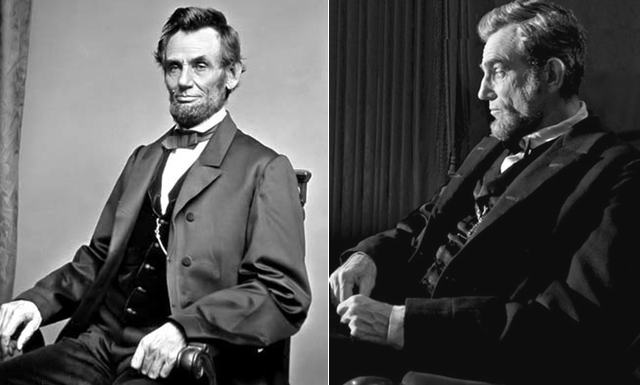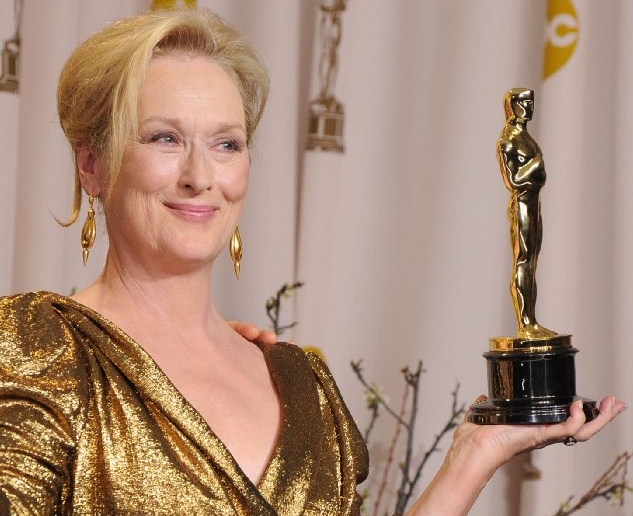How to win an Oscar

Image source: whatjeanlikes.com
“He has no genitilia, and he’s holding a sword,” said Dustin Hoffman of his Academy Award. Yet it is undeniable that good ol’ Oscar is the most desired guy in Hollywood; everybody wants one of him.
In fact, the awards show that hands out these coveted gold statuettes every year is so prestigious and star-studded that people would kill (not literally, I hope) just to be able to attend. And we have given you seven ways to get invited to the Oscars.
But once you actually get a golden ticket to the ceremony, what you really want is to add “Academy Award winner” to the front of your name. And actually winning an Oscar is a different ball game altogether.
For starters, you need to be attending as a nominee. Obviously. And this was number 1 on our list for how to get an invite to the Oscars:
1. Be nominated for an Academy Award.
Duh. And to do this, you’re going to need a lot of talent. Lots and lots of it. (On the controversial side, topics and themes in your project, or your personal background, might have some political influence on whether you’ll get one of the limited five nomination spots over another close competitor. No one is ever going to admit to this, of course. But we know it’s true.)
Luck is important too, because your odds at being nominated also depends on the level of competition for the year. Some years, really talented contenders are not nominated because there are not enough spots for the too many deserving film-makers and actors. So, luck will have to be on your side as well.
But once you have already been nominated (and at this point your Hollywood stock is skyrocketing), what does it take to be the one who gets to go up onstage and have the 8.5lb (3.85kg) gold-plated Oscar placed in your hands, then make a speech in front of millions of viewers?
Once again, getting an Oscar nomination is an achievement in itself, but actually winning is a different matter altogether. Even the goddess of acting that is Meryl Streep won “only” three out of her 18 nominations.
There are countless factors that determine which nominee wins the Oscar, and it differs for each award category. Hence, we will only focus on the acting awards.
So, assuming you have already been nominated in the acting category, here are 5 ways to increase your chances of winning an Oscar:
1. Play a real-life person

Image source: notevenpast.org
Daniel Day-Lewis (right) won an Oscar for playing Abraham Lincoln (left)
Believe you, me. This is one of the most time-tested and effective “methods” to actually winning the Oscar. Nothing stands out more to the Academy (except maybe #2) than playing a real-life person, and playing them well. Since you have already been nominated for the Oscar, it is pretty much a given that you were convincing as this real-life person, and your chances at winning the gold statuette go up considerably.
Just look at the winners for the past decade or so. From 2003 to 2014, eight of the 12 Best Actor Oscar winners played real-life people. The same number goes for women; seven of the 10 Best Actress Oscar winners from 2002 to 2011 played real-life people as well.
Oscar records have been broken with these roles. Adrien Brody is still the youngest actor ever (at age 29) to win the Academy Award for Best Actor, and he did so for his portrayal of real-life pianist Wladyslaw Szpilman in 2002′s The Pianist. Daniel Day-Lewis has more Best Actor Oscar wins than any other actor, and two of his three wins were for portrayals of real-life people (Christy Brown in 1989 and Abraham Lincoln in 2012).
So, yes, if you are the only (or one of the only) of the nominees who played a real-life person, get your acceptance speech ready.
Of course, that being said, luck (see #5) needs to be on your side, since this factor is clearly not going to be a deal-breaker if almost all of your fellow nominees also played real-life people. Exhibit A: Four of the five Best Actor nominees in 2015 played real-life people. Other factors are going to have to come into play now.
2. Play a character with “special” circumstances
Image source: saradobie.wordpress.com
Jared Leto won an Oscar for playing a transgender with AIDS in ‘Dallas Buyers Club’
Another way for you to stand out amongst the nominees is to play a character with “special” or “unique” (for lack of a better word and meant in a inoffensive manner) circumstances. As with #1, being nominated assumes you can convincingly play a “special” character (especially if you are nothing like said character in real life). And let’s face it, that is always a memorable performance. Your odds at winning will go up considerably.
At the 86th Academy Awards in 2014, three of the four acting category winners played characters with “special” circumstances; Cate Blanchett played a stressed socialite exhibiting various personality and psychological disorders, and Matthew McConaughey and Jared Leto played characters with AIDS. Leto’s character was additionally a transgender woman, and his performance was nothing short of phenomenal and one of the most memorable in recent years.
Three of the four Best Actress winners from 2011 to 2014 played characters with “special”, often psychological, circumstances. Some of the most memorable Best Actress Oscar wins include Hillary Swank’s portrayal of a transgender in Boys Don’t Cry (1999) and Charlize Theron’s portrayal of serial killer Aileen Wuornos in Monster (2003).
Note that Matthew McConaughey and Charlize Theron both won by portraying characters that simultaneously fall into categories #1 and #2. In other words, if you can combine multiple factors, you almost double your chances of winning.
3. Avoid popular studio movies in favour of indie dramas
Image source: elitist-movie.blogspot.com
Russell Crowe is arguably the last actor to win an Oscar for a “popular culture” film
If there is anything the Oscars have struggled with, it is keeping the “masses” interested in its nominees. The vast (and I mean vast) number of winners have been for performances in highbrow indie films that are great artistic achievements but that very few cinema-goers (in terms of the general public) really watch. Since many big budget studio movies are all about the moolah and low on substance, it is unsurprising that sincere indies and their actors have a significantly higher attendance (and success) rate at the Oscars. But there is concern that the Oscars might be biased against deserving studio blockbusters.
According to Ramin Setoodeh in Variety, the Oscars have been accused of “elitism” since snubbing The Dark Knight for Best Picture. He also argues that Jennifer Lawrence’s performance in The Hunger Games franchise should be just as worthy of recognition as her Oscar-winning performance in indie Silver Linings Playbook. That said, film genre potentially becomes a negative deal-breaker for you if your film is clearly a mainstream studio film and part of popular culture; you are likely going home empty handed.
True enough, every Best Actor and Best Actress winner since 2001 won for a movie that was either an indie or clearly not a mainstream studio film. The last Best Actor winner for a movie that scored big at the box office was arguably Russell Crowe in 2000′s Gladiator.
Actors in big budget studio films rarely even get nominated, and in the event that they do, well… The best way to phrase this is to say “avoid studio films if you want to avoid losing”.
4. Play the politics card
Image source: telegraph.co.uk
War film ‘The Hurt Locker’ beat goliath ‘Avatar’ to Best Picture. Some argue that politics was a factor.
This is a controversial point, but we all know it is true. Politics have prevented deserving nominees from winning the gold statuette in previous decades. The reverse has been happening recently, and many have argued that less deserving nominees (artistically speaking) have won because they played the politics card at the right time.
It is hard to say who truly won for politics over being the most artistically deserving as, let’s face it, these opinions are subjective and often unfounded. But just type “Oscars” and “politics” into the Google searchbox and you’ll get an endless list of opinion articles.
Thankfully, politics tends to have a larger influence in determining Best Picture winners than for the acting categories. But hey, it certainly raises your odds of winning if you acted in a film that is, shall we say, “politically favourable”.
5. Luck

Image source: clickhole.com
Four of the five Best Actor nominees in 2015 played real-life people
How many times have we heard that an actor was so phenomenal that he really should have taken home an Oscar for his performance, yet he still left empty handed? Likewise, how many times have we seen not that memorable performances win the gold statuette?
Luck plays a crucial role in determining whether you win the Oscars (as much as it determines whether you get nominated). The Oscars award the best in artistic achievement for that year. In other words, the level of competition for that year heavily influences your odds of winning. Your performance could be an undisputed win in one year, but that same performance could lose in a year with more competitive nominees.
Likewise, luck determines how many of the nominees have factors #1, #2, #3 and #4 in their pockets, and thus what having these factors means for your chances. As previously mentioned, playing a real-life person (#1) has almost no weight in 2015′s Best Actor category, since four out of the five nominees all played real-life people.
That said, it might be better to pray for luck before the nominations are announced rather than before the actual Oscars.



Leave a comment